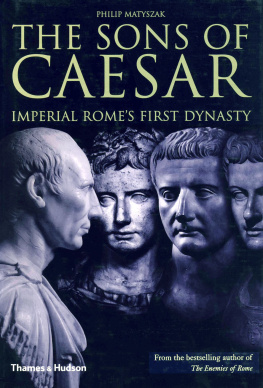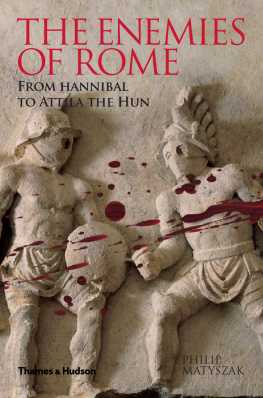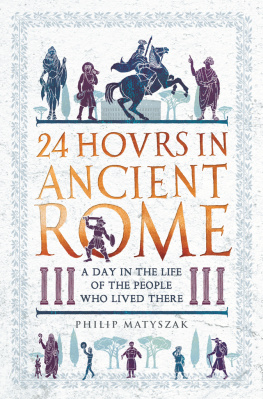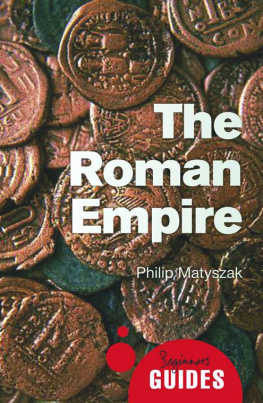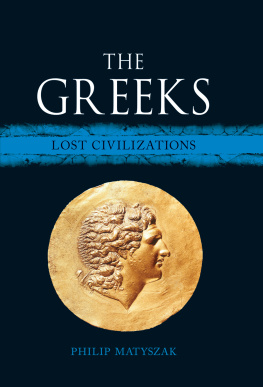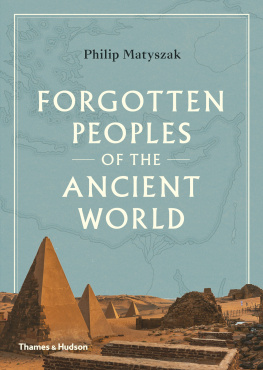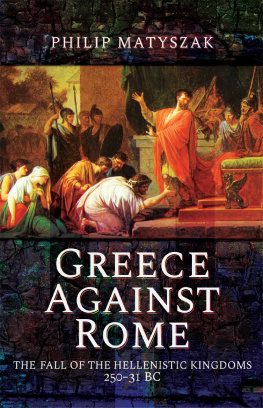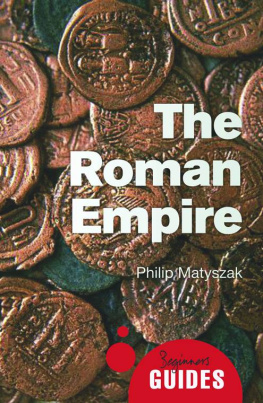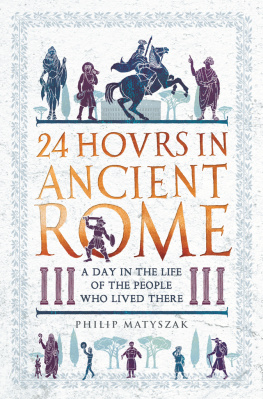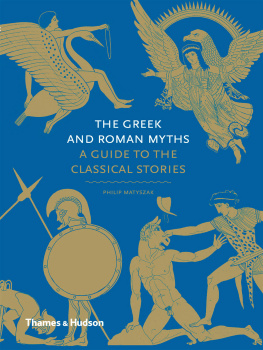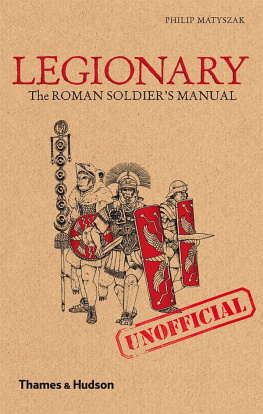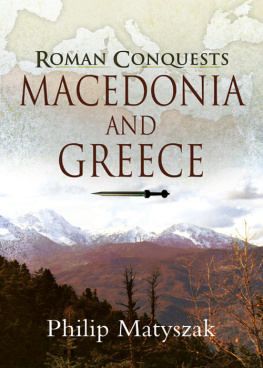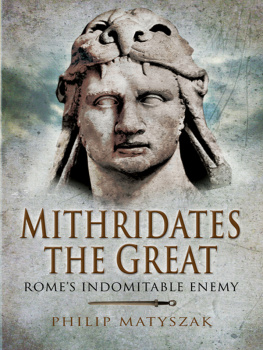Philip Matyszak - Invasion! Rome Against the Cimbri, 113-101 BC
Here you can read online Philip Matyszak - Invasion! Rome Against the Cimbri, 113-101 BC full text of the book (entire story) in english for free. Download pdf and epub, get meaning, cover and reviews about this ebook. genre: History. Description of the work, (preface) as well as reviews are available. Best literature library LitArk.com created for fans of good reading and offers a wide selection of genres:
Romance novel
Science fiction
Adventure
Detective
Science
History
Home and family
Prose
Art
Politics
Computer
Non-fiction
Religion
Business
Children
Humor
Choose a favorite category and find really read worthwhile books. Enjoy immersion in the world of imagination, feel the emotions of the characters or learn something new for yourself, make an fascinating discovery.
- Book:Invasion! Rome Against the Cimbri, 113-101 BC
- Author:
- Genre:
- Rating:4 / 5
- Favourites:Add to favourites
- Your mark:
- 80
- 1
- 2
- 3
- 4
- 5
Invasion! Rome Against the Cimbri, 113-101 BC: summary, description and annotation
We offer to read an annotation, description, summary or preface (depends on what the author of the book "Invasion! Rome Against the Cimbri, 113-101 BC" wrote himself). If you haven't found the necessary information about the book — write in the comments, we will try to find it.
Invasion! Rome Against the Cimbri, 113-101 BC — read online for free the complete book (whole text) full work
Below is the text of the book, divided by pages. System saving the place of the last page read, allows you to conveniently read the book "Invasion! Rome Against the Cimbri, 113-101 BC" online for free, without having to search again every time where you left off. Put a bookmark, and you can go to the page where you finished reading at any time.
Font size:
Interval:
Bookmark:
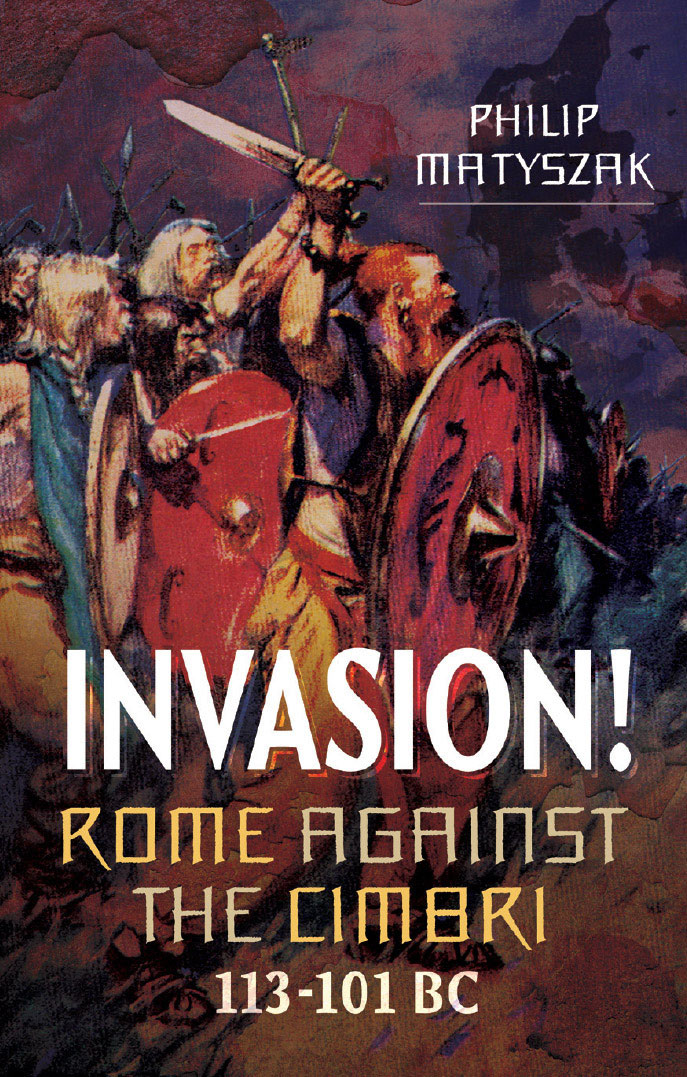
Invasion! Rome Against the Cimbri, 113101
BC
Invasion! Rome Against the Cimbri, 113101
BC
Philip Matyszak

First published in Great Britain in 2022 by
Pen & Sword Military
An imprint of
Pen & Sword Books Ltd
Yorkshire Philadelphia
Copyright Philip Matyszak 2022
ISBN 978 1 39909 731 4
Epub ISBN 978 1 39909 732 1
Mobi ISBN 978 1 39909 732 1
The right of Philip Matyszak to be identified as Author of this work has been asserted by him in accordance with the Copyright, Designs and Patents Act 1988.
A CIP catalogue record for this book is available from the British Library.
All rights reserved. No part of this book may be reproduced or transmitted in any form or by any means, electronic or mechanical including photocopying, recording or by any information storage and retrieval system, without permission from the Publisher in writing.
Pen & Sword Books Limited incorporates the imprints of Atlas, Archaeology, Aviation, Discovery, Family History, Fiction, History, Maritime, Military, Military Classics, Politics, Select, Transport, True Crime, Air World, Frontline Publishing, Leo Cooper, Remember When, Seaforth Publishing, The Praetorian Press, Wharncliffe Local History, Wharncliffe Transport, Wharncliffe True Crime and White Owl.
For a complete list of Pen & Sword titles please contact
PEN & SWORD BOOKS LIMITED
47 Church Street, Barnsley, South Yorkshire, S70 2AS, England
E-mail: enquiries@pen-and-sword.co.uk
Website: www.pen-and-sword.co.uk
Or
PEN AND SWORD BOOKS
1950 Lawrence Rd, Havertown, PA 19083, USA
E-mail: Uspen-and-sword@casematepublishers.com
Website: www.penandswordbooks.com
For a century after the Hannibalic War, Rome went through a turbulent period of savage politics and almost unrelenting warfare. Yet only once in all that time was Rome fighting for its very survival. For the most part Rome fought wars of conquest, as what was once a small city in Latium grew unstoppably into an empire which spanned the Mediterranean world. In the second century bc, Rome fought the heirs of Alexander the Great, conquering Macedon and humbling the mighty Seleucid empire. It was not enough that after the Hannibalic war Rome had eliminated Carthage as a rival power in the western Mediterranean at the insistence of Cato the Elder and his supporters, Carthage was wiped out altogether in 146
BC
.
Yet, for all that Rome seemed to be growing ever more powerful, all was not well within the Republic. Almost throughout the history of Rome, there had been tension between the aristocratic upper class and the working people who powered the Roman economy and supplied recruits for the army. Generally, these class disputes were solved with minimal violence, but after the Carthaginian wars these disputes became violent and bloody. In part this was because the balance of power had swung firmly in favour of the aristocracy, and attempts to redress that issue by reformers such as the Gracchus brothers were met with violent repression that led to the deaths of both Gracchi and many of their followers.
This repression coarsened the political process but also damaged Romes military ability. Roman commanders had previously been selected at least partly on merit, but the aristocratic capture of Romes political institutions meant that generalship and actual military ability became increasingly separate qualities. Romans of noble family who should not have been put in charge of a toy gladiator set commanded armies which they saw only as tools by which they could gain profit from loot and political kudos. Towards the end of the second century this had led to a series of unnecessary defeats in Spain and elsewhere, but none of these defeats threatened Rome seriously enough to necessitate a change in the status quo. All that changed with the arrival of the Cimbri. The Cimbri not only threatened Rome they threatened to destroy it altogether.
The story of the Cimbri is both fascinating and frustrating. These people were every bit as much a threat to Rome as Hannibal had been in the previous century. Yet, while everyone with even a vague interest in Roman history has heard of Hannibal and Romes wars with Carthage, very few people other than professional historians have heard of the Cimbri. Yet here we see a tribe from the location of modern Denmark leave their traditional home and begin a massive southward trek. This was no relatively trivial group such as the 30,000 or so Visigoths who captured and sacked Rome in ad 410. The Cimbric invasion of half a millennium previously was literally ten times larger and that is before we count Cimbric allies such as the Teutones and Ambrones who are said to have doubled the size of the invading host. In numbers alone the Cimbri were a terrifying menace.
The reasons why the Cimbri suddenly decided to leave their northern homeland are controversial and discussed at length in the opening chapters of this book. Once they had left Jutland, the Cimbri moved slowly south in search of a new home, including Illyria and Spain in their travels. During the course of those travels they met Roman army after Roman army and at least partly due to poor generalship on the Roman side crushed each of these in turn. One such battle was among the greatest Roman defeats ever recorded, a massacre of the legions comparable with that at Cannae in 216 bc. Yet, while Cannae is known to every military historian, few remember the 80,000 or so Romans whom the Cimbri killed at Arausio in 105 bc.
Had the Cimbri followed up their success at Arausio with a march on Rome, it is quite possible that this book would be written in a very different language. Romes Italian allies had very little fondness for the corrupt and oppressive state which governed them (they were to rise in a concerted rebellion against Rome just over a decade later). Had the Cimbri taken Rome, it is quite possible that the Italians might have joined the Cimbri in stamping out the last remnants of that failing state. Romes nascent empire would have collapsed and later histories would talk of Rome as they talk of the Seleucid and Neo-Babylonian empires, states which briefly expanded to occupy huge swathes of territory only to quickly collapse once again.
So, given that the Cimbric wars brought Rome to the brink of extinction and involved hundreds of thousands of men on both sides, how is it that so few know of the Cimbri today?
Probably the main reason why the story of the Cimbric migration has been largely forgotten is because few tellings of that story from antiquity have survived the vagaries of time. We know a great deal of a relatively trivial war fought just before the Cimbric invasion because a detailed history of that war has come down to us. This is Sallusts account of the Jugurthine War, fought in Africa against the renegade Numidian king Jugurtha. As a writer, Sallust is capable of punchy prose and he held little back in his ferocious condemnation of the corrupt oligarchy which dominated contemporary Roman politics. His is a very readable text, and for that reason it has survived the passing millennia.
As a result we have some quite detailed accounts of skirmishes in desert sandpits which involved a few hundred men on either side. Meanwhile north of the Alps, armies of tens of thousands clashed in battles the date and location of which are now mostly a matter of conjecture. We are ignorant of so many of the key details of the Cimbric wars that it is hard to pay much attention to what remains. So, while the Jugurthine War in Africa features prominently in accounts of the later Republic, the much more important Cimbric wars tend to merit only a quick paragraph or two.
Next pageFont size:
Interval:
Bookmark:
Similar books «Invasion! Rome Against the Cimbri, 113-101 BC»
Look at similar books to Invasion! Rome Against the Cimbri, 113-101 BC. We have selected literature similar in name and meaning in the hope of providing readers with more options to find new, interesting, not yet read works.
Discussion, reviews of the book Invasion! Rome Against the Cimbri, 113-101 BC and just readers' own opinions. Leave your comments, write what you think about the work, its meaning or the main characters. Specify what exactly you liked and what you didn't like, and why you think so.


